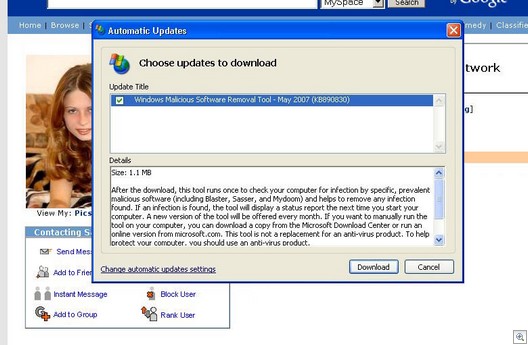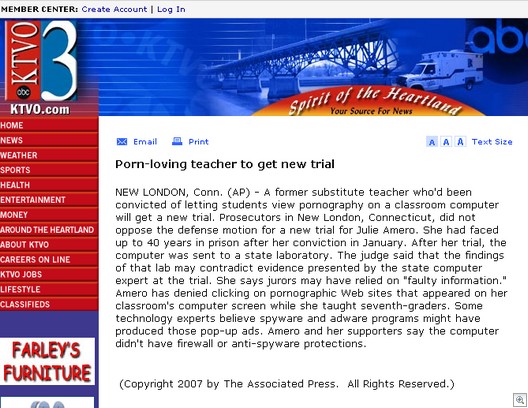Vista: Multiple languages can now peacefully coexist
In today’s world, you might find yourself sharing a computer with someone whose primary language is different from your own. In previous versions of Windows, changing the language was a global setting, but in Vista, you can install and select different languages on a per-user basis. When a user logs on, his or her interface will display in the selected language.
How to disable the automatic Desktop Cleanup Feature in XP
In XP, Microsoft introduced the Automatic Desktop Cleanup feature, which can remove icons that you don’t use frequently. Some of us, however, don’t want our desktops cleaned up. By default, the Desktop Cleanup wizard runs every 60 days. You can disable it by doing the following:
- Right click a blank space on the desktop and select Properties, or select Display from Control Panel. Either of these opens the Display Properties dialog box.
- Click the Desktop tab.
- Click the Customize Desktop button.
- Clear the check box labeled Run Desktop Cleanup Wizard Every 60 Days.
- Click OK and then OK again to close the dialog boxes.
You can still run the wizard manually by clicking the Clean Desktop Now button after steps 1 and 2.
How to use DRM-protected files after upgrading
Getting a new computer or upgrading your operating system can be a fun adventure – or a nightmare. Some folks resist upgrading because they don’t know whether they’ll have all the functionality they had before. For instance, how do you play those songs you bought from an online music store if you transfer them to a new computer or upgrade the OS?
With most digital rights management (DRM) schemes, you need to download the media usage rights (license). These are stored on your computer separately from the song file itself. Windows Media Player 11 will try to download the rights automatically. Sometimes you’ll have to sign onto the online store to get the rights. And some online stores will only let you restore your rights a limited number of times.
For more info about DRM and Windows Media Player, see the FAQ here.
Use new Office formats for better security – even with the old Office
Even if you’ve upgraded to Office 2007, you may still be using the old file formats for compatibility. But you should know that not only do the new XML- based formats (.docx, .xlsx, .pptx, etc.) have the advantage of smaller file sizes, they are also more secure. Malware authors can use the old formats to attack Office users.
With the Microsoft Office Isolated Conversion Environment (MOICE), which converts the old binary files to the new format and the Compatibility Pack add- in that lets you open, edit and save XML-based formats in Office XP and 2003, you can benefit from the increased security of the new file formats without even installing Office 2007.
Download the Compatibility Pack here. You can find out more about MOICE and download it here.
How do I get the normal icons on the desktop in Vista?
QUESTION: I know the intent with Vista is to have a clean desktop look, but I don’t want my desktop quite that clean. Is there a way to put the normal icons (My Computer, Recycle Bin, Documents, etc.) on the desktop without having to individually create shortcuts? – Tom W.
ANSWER: It seems that this is one of those options that’s “hidden in plain sight” in Vista. Lots of people overlook it, but all you have to do is open the Personalization dialog box (right click an empty space on the desktop and select Personalize). Right over there on the left side, in the Tasks pane, you’ll see a link labeled “Change desktop icons.” Here you can check boxes to display the Computer, Network, User’s Files, Recycle Bin and/or Control Panel on the desktop.
Unfortunately, this dialog box doesn’t give you the option to display the Internet Explorer icon, but you can easily make a shortcut to that program in the usual way, by right dragging and dropping and selecting Make Shortcut Here.
How can I turn off Clear Type in Vista?
QUESTION: Okay, I know Clear Type looks good on my laptop and on LCD monitors, but I have an old fashioned CRT and having Clear Type enabled by default makes fonts look blurry. I haven’t figured out how to turn it off – can you help? – Wayne S.
ANSWER: Turning off Clear Type is as easy as a few clicks of the mouse – if you know where to click. As in the question above, you first open the Personalize dialog box, but then it gets trickier. Click the Windows Color and Appearance option, and then at the bottom, click Open Classic Appearance Properties for More Color Options (I know that doesn’t sound like the right selection, but it is). Then in the Appearance Settings dialog box, click the Effects button. Here, under “Use the following method to smooth edges of screen fonts,” in the drop- down box select “Standard” instead of “Clear Type.” That should clear things up for you on your old CRT.
New version of Live Writer makes blogging easier
My blogging client of choice has been Windows Live Writer ever since I discovered an early beta. I’m happy to announce that it just got better, with the release of a new beta version that added several of the features I’d been wishing for – including the ability to “set and forget” publication dates for posts. You can also insert videos, emoticons and tables with one-click ease. I do a full review of the new version and tell you how to get it, on my blog post of June 3, titled “Testing New Live Writer“.
Clean up your Spreadsheets
Want your Excel spreadsheets to look more professional? Get rid of those sloppy duplicate rows, remove spaces and non-printing characters from text, fix numbers and number signs, rearrange columns and rows and more. This article, “Top Ten Ways to Clean Your Data,” shows you how to do it all.
Hardware Secrets – Revealed
What’s the best way to get more bang for your buck with the hardware you have? This article contains lots of tips for upgrades and add-ons for your computer, phone, camera, printer and other hardware devices. See “53 Hardware Secrets” from MSN Tech & Gadgets.
Create custom Out of Office replies for Outlook 2007
While many hate them, many still use them. Want to create your own customized responses for incoming email when you go on vacation (vacation? What’s that?) or a business trip or otherwise have to be away from your Internet connection for a few days? If you use Outlook 2007 on Window XP or Vista, you can download the Outlook 2007 OoO Assistant.
Computing on your Tabletop
The big news in the computer world this past week has been the unveiling of Microsoft’s new “surface computing” device, which literally puts an interactive computer screen on your tabletop. Code named Milan and sometimes called Playtable, the new touch screen device looks pretty amazing in the demonstration video. I can see how it would be very handy for certain applications, but for my own day-to-day work, I want a keyboard. Still, this is probably the wave of the future, and when combined with speech recognition technology, will make Star Trek style computing a reality.
Apple embeds personal info in song files
If you use Apple’s iTunes, you’re probably pleased by the new iTunes Plus service that doesn’t use copy protection software. However, you should be aware that your name and email address are embedded in the song files you download, according to the Electronic Frontier Foundation (EFF). That means if you share those files on a peer-to-peer network, they can be tracked back to you. No worries if you don’t plan to share, right? Well … maybe not. If you lost your portable computer or MP3 player or it was stolen, your email address would be “out there” – something you may not want to happen. You can read more here.
You get an error message if you try to open an .exe file in XP or Windows 2000
If you attempt to start a program from an executable file with the .exe extension on a Windows XP or Windows 2000 computer and get an error message that says “Windows cannot find .exe” or something similar, this may be because your computer has become infected with the W32/Swen.A@MM worm. You can fix the problem by editing the registry. For instructions on how to do so, see KB article 8377334.
Floppy disk formats supported in XP
Does anyone still use floppy disks? Apparently quite a few people still do, even though most few computers don’t even come with a floppy drive. Heck, I still have a box of floppies in the closet that contain the original files for a lot of old lesson plans and syllabi I used back when I was teaching criminal justice courses full time, even though copies were long ago transferred to CD. But if you do have a floppy drive and you try to use from of those old disks, you may have noticed that some types of floppies can’t be formatted on your XP computer. KB article 309623 provides more info on the floppy formats that are supported by XP.
Vista computer goes to sleep during Bluetooth file transfer
If you’re running Windows Vista and you try to copy a large file to or from another Vista computer, you may find that one of the systems goes to sleep during the transfer, preventing the task from completing properly. You might need to change your power management settings to prevent this from happening. For more information, see KB article 937827.
Until next week,
Deb Shinder, MVP
 A mother (who is also a former cop) gets in trouble over sippy cup.
A mother (who is also a former cop) gets in trouble over sippy cup.







